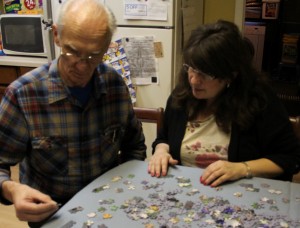 Sheri Zschocher, caregiver for her husband with Alzheimer’s, asks, “Should a person with dementia or Alzheimer’s be allowed to vote?”
Sheri Zschocher, caregiver for her husband with Alzheimer’s, asks, “Should a person with dementia or Alzheimer’s be allowed to vote?”
“My husband talks about voting and I know he is not capable of forming an opinion when he cannot filter information correctly. What do you know about this topic if anything?”
The Caregiver’s Voice Answers: If a person is declared incompetent and has a legally appointed guardian or conservator, that person may have the right to vote on his/her behalf.
Years ago, while caring for and serving as my father’s conservator, I struggled with this dilemma.
My father’s political views were to the right of my center. I knew he was serious about voting at each election. When I was a child, I’d walk with him to the old-time voting booths and stand by the door, as he’d enter the booth, pull the lever to close the heavy dark green canvas that wrapped around like a shower curtain for privacy. Then he’d emerge and we’d walk home.
Times have changed and when he lived with us in California, there were just too many propositions and small print for even me to make sense of it all. By the year 2000, my father was in late-stage Alzheimer’s, so I decided not to cast his vote for the U.S. President. Reflecting on it, he got his way, anyway.
People living with dementia who are still capable of reading and making sense of propositions and candidate statements, should continue voting as long as they want.
If he’s aware enough to ask the question, you might accompany him to the voting booth on a special needs basis to help him cast his vote. Or apply for an absentee ballot and help him vote.
Given what you wrote above, Sheri, I’m not sure “Al” (Alzheimer’s) is letting go of his grip on your husband Bob to allow him to exercise sufficient judgment to cast a vote.
Despite my perceptions, I would suggest one of three options; the third seems the most reasonable.
- Assist him with voting if you believe it will make enough of a positive difference in how he feels and functions.
You’ll need to file his condition with the elections official in your state so you can help him vote. However, if he is declared incompetent this should not go any further. - Get an absentee ballot and discuss the materials then vote your ballots together.
If he’s always voted in person this may not have the desired effect of him feeling he’s cast his vote. - Ask him to help you decide. Discuss with him. At the very least, this will make him feel involved and that his thoughts still matter.
Click to read more about The Caregiver’s Voice Caregiver of the Month Sheri Zschocher
For related information regarding one’s capabilities while living with dementia, click to read about a related topic: When should a person with dementia stop driving?









Thank you for taking time to respond to my question Brenda, your insight was very helpful!
Thank you, Brenda, for finding and sharing the ways to respect and uphold a person’s contributions to society. Voting one’s beliefs can be done with a little help from our friends.
Thank YOU for taking a moment to write such a kind message, Tryn Rose! 🙂